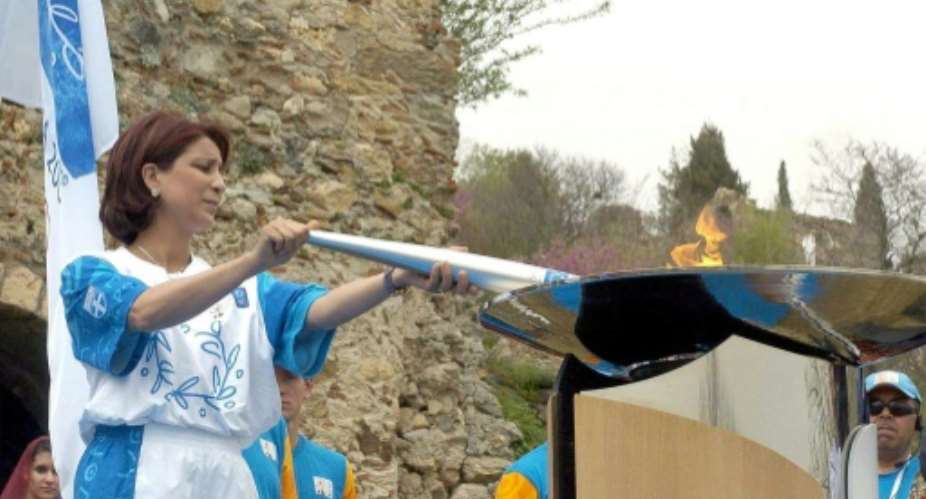Nawal El Moutawakel took just 54 seconds to go from the "dark to the light" when she became the first Muslim woman from Africa to win Olympic gold in the 400 metres hurdles at the 1984 Games.
The 56-year-old Moroccan has since forged a successful career as a sports administrator having twice been Minister of Sports, and is an influential member of both the International Olympic Committee (IOC) and the International Association of Athletics Federations.
"I consider myself a role model with my other Olympic champions back home in Morocco," she told AFP.
"I could have stayed and spent most of my life enjoying my glory of 1984 but no, that's wrong.
"54 seconds allowed me to go from dark to light, like I said from zero to hero. I would like to share every single moment with the younger generation."
El Moutawakel, whose victory in Los Angeles was marked by the then King Hassan II ordering every girl born that day named in her honour, said the hurdles on the track reflected the challenges she had faced in her life.
However, she always met them head on, claiming "my victory meant no more just washing the dishes for women".
"In my religion, women were never forbidden to compete," she said at the recent Laureus awards.
"Our prophet (Mohammed) used to run against his wife, and she used to beat him, until she found out she was pregnant, that's how he beat her.
"Women could compete equally as men, and that's why I felt growing up in an environment that was very supportive, very positive until today, so I don't think there is any resistance whatsoever."
El Moutawakel supports her claim by citing a passage from the Koran in Arabic.
"Teach your children how to run, do horse-back riding, and also swimming," she said.
"This is in our religion. He never said, teach your daughter, or teach your son. It says 'teach your children', and in children, there is a son and daughter."
'Rubies, diamonds come in small packages'
 Nawal El Moutawakel has come a long way from being a shy girl to become an influential sports administrator. By VANDERLEI ALMEIDA (AFP)
Nawal El Moutawakel has come a long way from being a shy girl to become an influential sports administrator. By VANDERLEI ALMEIDA (AFP)
El Moutawakel, a mother of two children, daughter Zineb and son Roda, certainly received all the support she desired from her parents, especially her father Mohammed.
He allayed her fears of how much bigger some of her rivals were by saying "rubies and diamonds come in small packages."
"My father was a judoka, my mum did physical activities at high school, we grew up five brothers and sisters, we were all in the same club and we all did athletics so I was in an environment that was very positive, very supportive," she said.
"I never felt any resistance (to her wanting to be an athlete) whatsoever.
"Until the day I won in 1984, August 8th, when many microphones were placed in front of me, talking about this resistance.
"And I was like, what do you mean?"
El Moutawakel, whose great regret is her devoted father did not live to see her moment of glory, dying in a car crash in early 1984 a week after she had started university in the United States, found the spotlight unnerving.
"When I ran in 1984, my coaches (Iowa University's Ron Renko and Pat Moynihan) were teaching me how to run, but they weren't teaching me how to speak," she said.
"So all of a sudden I had hundreds of journalists with microphones wanting me to speak, and I said 'I have nothing to say, I showed you in my performance'."





 We’ll no longer tolerate your empty, unwarranted attacks – TUC blasts Prof Adei
We’ll no longer tolerate your empty, unwarranted attacks – TUC blasts Prof Adei
 Bawumia donates GHc200,000 to support Madina fire victims
Bawumia donates GHc200,000 to support Madina fire victims
 IMF to disburse US$360million third tranche to Ghana without creditors MoU
IMF to disburse US$360million third tranche to Ghana without creditors MoU
 Truck owner share insights into train collision incident
Truck owner share insights into train collision incident
 Paramount chief of Bassare Traditional Area passes on
Paramount chief of Bassare Traditional Area passes on
 Two teachers in court over alleged illegal possession of BECE papers
Two teachers in court over alleged illegal possession of BECE papers
 Sunyani: Victim allegedly shot by traditional warriors appeals for justice
Sunyani: Victim allegedly shot by traditional warriors appeals for justice
 Mahama vows to scrap teacher licensure exams, review Free SHS policy
Mahama vows to scrap teacher licensure exams, review Free SHS policy
 Government will replace burnt Madina shops with a new three-story, 120-store fac...
Government will replace burnt Madina shops with a new three-story, 120-store fac...
